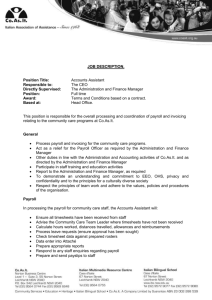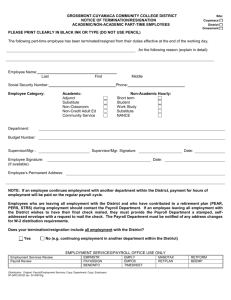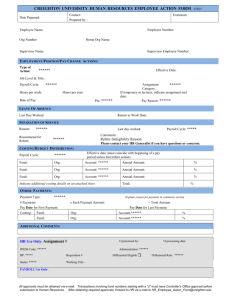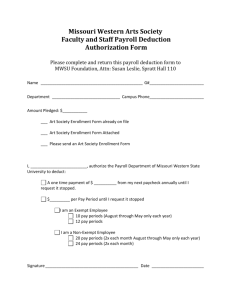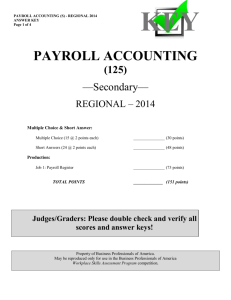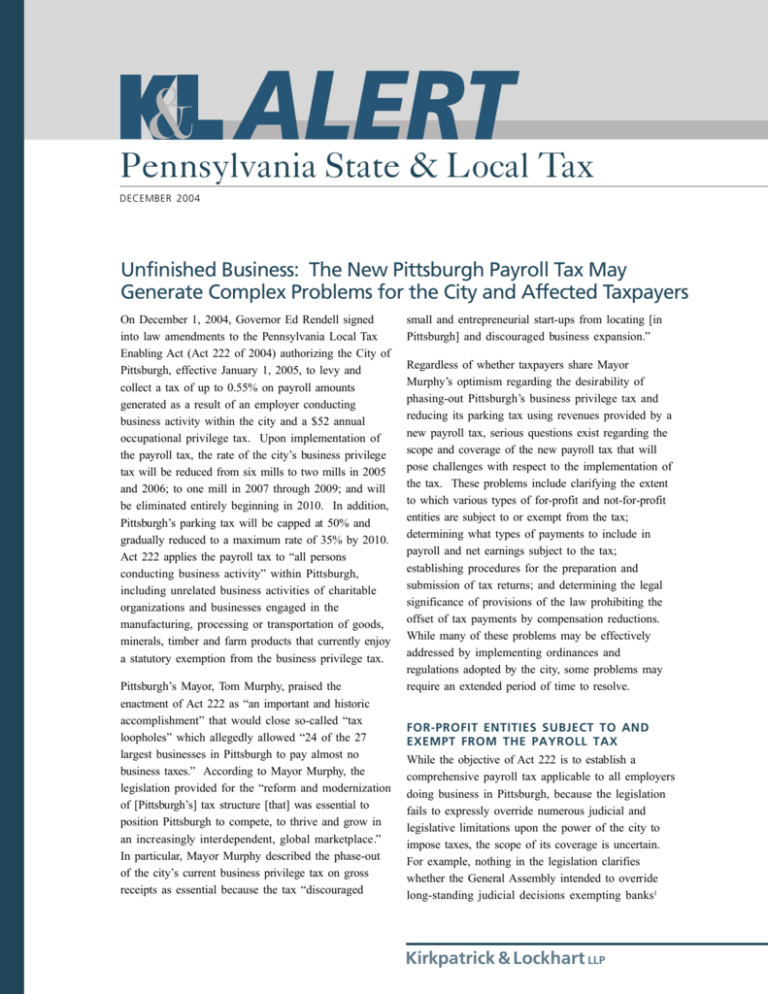
Pennsylvania State & Local Tax
DECEMBER 2004
Unfinished Business: The New Pittsburgh Payroll Tax May
Generate Complex Problems for the City and Affected Taxpayers
On December 1, 2004, Governor Ed Rendell signed
into law amendments to the Pennsylvania Local Tax
Enabling Act (Act 222 of 2004) authorizing the City of
Pittsburgh, effective January 1, 2005, to levy and
collect a tax of up to 0.55% on payroll amounts
generated as a result of an employer conducting
business activity within the city and a $52 annual
occupational privilege tax. Upon implementation of
the payroll tax, the rate of the city’s business privilege
tax will be reduced from six mills to two mills in 2005
and 2006; to one mill in 2007 through 2009; and will
be eliminated entirely beginning in 2010. In addition,
Pittsburgh’s parking tax will be capped at 50% and
gradually reduced to a maximum rate of 35% by 2010.
Act 222 applies the payroll tax to “all persons
conducting business activity” within Pittsburgh,
including unrelated business activities of charitable
organizations and businesses engaged in the
manufacturing, processing or transportation of goods,
minerals, timber and farm products that currently enjoy
a statutory exemption from the business privilege tax.
Pittsburgh’s Mayor, Tom Murphy, praised the
enactment of Act 222 as “an important and historic
accomplishment” that would close so-called “tax
loopholes” which allegedly allowed “24 of the 27
largest businesses in Pittsburgh to pay almost no
business taxes.” According to Mayor Murphy, the
legislation provided for the “reform and modernization
of [Pittsburgh’s] tax structure [that] was essential to
position Pittsburgh to compete, to thrive and grow in
an increasingly interdependent, global marketplace.”
In particular, Mayor Murphy described the phase-out
of the city’s current business privilege tax on gross
receipts as essential because the tax “discouraged
small and entrepreneurial start-ups from locating [in
Pittsburgh] and discouraged business expansion.”
Regardless of whether taxpayers share Mayor
Murphy’s optimism regarding the desirability of
phasing-out Pittsburgh’s business privilege tax and
reducing its parking tax using revenues provided by a
new payroll tax, serious questions exist regarding the
scope and coverage of the new payroll tax that will
pose challenges with respect to the implementation of
the tax. These problems include clarifying the extent
to which various types of for-profit and not-for-profit
entities are subject to or exempt from the tax;
determining what types of payments to include in
payroll and net earnings subject to the tax;
establishing procedures for the preparation and
submission of tax returns; and determining the legal
significance of provisions of the law prohibiting the
offset of tax payments by compensation reductions.
While many of these problems may be effectively
addressed by implementing ordinances and
regulations adopted by the city, some problems may
require an extended period of time to resolve.
FOR-PROFIT ENTITIES SUBJECT TO AND
EXEMPT FROM THE PAYROLL TAX
While the objective of Act 222 is to establish a
comprehensive payroll tax applicable to all employers
doing business in Pittsburgh, because the legislation
fails to expressly override numerous judicial and
legislative limitations upon the power of the city to
impose taxes, the scope of its coverage is uncertain.
For example, nothing in the legislation clarifies
whether the General Assembly intended to override
long-standing judicial decisions exempting banks1
Kirkpatrick & Lockhart LLP
and beer distributors2 from local taxation on the basis
of a state preemption. Likewise, because of state
preemption it is uncertain whether slot machines
licensees authorized to do business within the city by
the Pennsylvania Gaming Control Board will be
subject to the tax.3 In addition, the legislation fails to
clarify whether it is intended to override various
existing statutory exemptions from local taxation
provided for credit unions,4 mutual thrift institutions,5
and hospital plan and professional health service
corporations (i.e., Blue Cross and Blue Shield).6
business activities. For example, the city will need to
determine whether foundations generating funds and
distributing grants to charitable organizations are
engaged in business activities subject to the tax.
Furthermore, to the extent non-profit organizations do
not own real property within Pittsburgh and have not
been classified as institutions of purely public charity
by the city, it will be necessary to determine whether
the city will accept or seek to review charitable
exemptions granted for sales and use tax purposes by
the Pennsylvania Department of Revenue.
NOT-FOR-PROFIT ENTITIES SUBJECT TO
AND EXEMPT FROM THE PAYROLL TAX
CHALLENGES OF CONSTITUTIONAL AND
STATUTORY INTERPRETATION
Applying Act 222 to non-profit entities may also pose
difficult challenges. Charitable organizations that
qualify for tax exemption pursuant to the Institutions
of Purely Public Charity Act are required to calculate
the tax attributable to the city based upon their total
payroll, but are only required to pay tax on that
portion of payroll expense attributable to “business
activity” for which a tax may be imposed pursuant to
§ 511 of the Internal Revenue Code, i.e., payroll
attributable to unrelated business income as reported
on IRS Form 990T. In addition, if the charity operates
branches, affiliates, subsidiaries and other business
entities that do not independently qualify as
institutions of purely public charity, the tax must be
paid on the payroll attributable to such branches,
affiliates or subsidiaries, regardless of whether the
employees are leased or placed under the charity’s
umbrella or parent organization. Charities may,
however, contract with the city to provide services for
the benefit of the city in lieu of taxes due.
In resolving issues relating to the whether various forprofit and not-for-profit entities are subject to the
payroll tax, the city will be forced to confront difficult
issues relating to the constitutional uniformity of
taxation and the statutory interpretation of enabling
legislation.
In implementing Act 222, the city will need to
determine the extent to which non-profit organizations
that do not qualify as institutions of purely public
charity otherwise constitute “employers” engaged in
1
2
3
4
5
6
2
To the extent the city elects to selectively apply the
tax to some but not all businesses, uniformity problems
may arise. For example, if the city elects to recognize
statutory exemptions from taxation for credit unions
(especially those with community charters) but not
commercial banks and mutual savings banks, will the
legislation irrationally discriminate against similarly
situated taxpayers? Likewise, will the tax be subject to
attack based upon impermissible discrimination if it is
applied to commercial health insurers, but not Blue
Cross and Blue Shield Plans
On the other hand, to the extent the city interprets
Act 222 as applicable to all “employers,” various legal
and practical problems may arise. Legally, the city
may be confounded by provisions of Pennsylvania
Statutory Construction Act requiring that laws
imposing taxes must be strictly construed with any
City of Pittsburgh v. Allegheny Valley Bank of Pittsburgh, 412 A.2d 1366 (Pa. 1980).
Commonwealth v. Wilsbach Distributors, 519 A.2d 397 (Pa. 1986).
See e.g., Liberty Racing Association v. Philadelphia Tax Review Board, 488 A.2d 1063 (Pa. Cmwlth. 1984) (holding that the
General Assembly by enacting legislation licensing, comprehensively regulating and imposing special taxes on harness racing
intended to preempt all local regulation, including taxation).
17 Pa. C.S. § 517 (“A credit union incorporated under or subject to this title … shall not be subject to taxation except as to real
estate owned by it”).
72 P.S. § 8502(e) (“Institutions subject to the provisions of this article … shall be exempt from all local taxation imposed by
political subdivisions of this Commonwealth … except taxes on real estate or transfers thereof”).
40 Pa.C.S. §§ 6103(b) & 6307(b) (Every health plan corporation and professional health service corporation “shall be exempt
from taxation by the Commonwealth and its political subdivisions”).
KIRKPATRICK & LOCKHART LLP PENNSYLVANIA STATE & LOCAL TAX ALERT
uncertainty resolved in favor of the taxpayer. 7
Likewise, in implementing the payroll tax the City will
be forced to cope with provisions of the Statutory
Construction Act providing that whenever a general
provision in a statute conflicts with a special provision
in another statute, the two shall be interpreted to give
effect to both with the special provision being
construed as an exemption to the general provision,
absent a “manifest” contrary intent expressed by the
General Assembly.8 From a practical perspective, the
City may also be faced with the retaliatory tax laws of
other states relating to the taxation of insurance
companies and may be limited in its ability to impose
the tax on state-chartered credit unions because of their
ability to convert to national charters exempt from
state taxes as a matter of federal law.
PAYROLL SUBJECT TO TAXATION
Act 222 defines “payroll amounts” subject to taxation
as “all amounts paid by an employer as salaries, wages,
commissions, bonuses, net earnings and incentive
payments” and “fees and similar remuneration for
services rendered.” The term “employer” is defined to
mean “all persons conducting business activity within
[Pittsburgh], except for a governmental entity.” An
employer is deemed to be conducting business activity
within the city if the employer maintains a fixed place
of business within the city, owns or leases real property
within the city for business purposes, maintains a stock
of tangible personal property within the city for sale in
the ordinary course of business, conducts “continuous
solicitation” within the city related to a business, or
utilizes the streets of the city in connection with the
operation of a business, except for transportation
through the city. Total payroll is apportioned to the
city for tax purposes based upon the “portion of
payroll expense which the total number of days an
employee, partner, member, shareholder or other
individual works within the city bears to the total
number of days such employee or person works within
and outside the city.”
The broad definition of payroll fails to clarify whether
or not the tax applies to fringe benefits, including
7
8
9
health, accident and life insurance payments;
payments to employee cafeteria plans; moving
expense payments; employee achievement awards;
reimbursement of employee expenses, including
expenses for meals, lodging and travel; workers’
compensation and disability pay; dependent care
benefit payments; deferred compensation; tuition or
scholarship payments; retirement benefits and other
State and federal payroll taxes. Act 222 also fails to
clarify the extent to which payments to partners,
members and shareholders participating in passthrough entities constitute “remuneration for services
rendered” as opposed to earnings on capital invested in
an enterprise. It is similarly unclear regarding the
extent to which “fees and similar remuneration for
services rendered” subject to the tax constitute the
gross receipts, rather than payroll, of businesses
primarily engaged in the provision of services.
One approach to minimizing these concerns may be for
the City of Pittsburgh in implementing Act 222 to
interpret the term “payroll” consistent with the policies
of the Internal Revenue Service incorporated into the
Simplified Tax and Wage Reporting System and as
recently codified in the Uniform Wage Withholding
and Unemployment Insurance Act.9 Other problems,
however, especially with respect to the application of
the tax to “net earnings,” will require solutions for
which no template or precedent is readily available.
THE PREPARATION AND SUBMISSION
OF TAX RETURNS
Implementing ordinances and regulations will be
critically needed to supplement the scanty provisions
of Act 222 relating to the preparation and submission
of tax returns. Although the legislation requires that all
employers file quarterly returns and make quarterly
payments of the correct amount due, and imposes
substantial penalties for underpayments of obligations,
no quarterly payment schedule is established, no
system of annual reconciliation is established, and no
safe-harbors are provided for taxpayers not able to
accurately estimate earnings on a quarterly basis. At a
minimum, these details will be critical to the
1 Pa.C.S. § 1928(b)(3).
1 Pa.C.S. § 1933.
The text of the Uniform Act is available at www.nccusl.org.
DECEMBER 2004
Kirkpatrick & Lockhart LLP
establishment of a workable tax system that avoids
imposing unreasonable administrative burdens on
taxpayers.
Implementing ordinances and regulations may also be
necessary to address provisions of Act 222 that allow
non-profit organizations to provide services to the city
in lieu of making tax payments. In particular,
standards will be required for the execution of Service
in Lieu of Payroll Tax Agreements and to coordinate
such agreements with existing Payment in Lieu of Tax
Agreements (“PILOTS”).
LIMITATIONS ON PAYROLL AND BENEFIT
REDUCTIONS
In an apparent attempt to distinguish the payroll tax
from the less politically palatable alternative of
increasing wage taxes or adopting a commuter tax,
Act 222 requires that “an employer shall not offset the
amount of tax paid … by reducing compensation or
benefits to employees.” Unfortunately, this provision
has the potential for creating a host of legal and
practical problems for taxpayers and the city.
In the interest of minimizing problems associated with
the anti-offset language, implementing ordinances and
regulations should ideally define the applicability and
limitations of the requirement and provide a variety of
safe-harbors by which taxpayers can avoid inadvertent
violations of the law.
CONCLUSION
While the passage of Act 222 may constitute the
historic event described by Mayor Murphy,
successfully implementing a payroll tax will require
extensive work and cooperation between the city and
affected taxpayers and the development of detailed
and comprehensive implementing ordinances and
regulations. Completing this work in time to
implement the new tax on a timely basis will clearly
constitute a substantial challenge. Kirkpatrick &
Lockhart will monitor developments relating to the
implementation of Act 222 and will provide further
guidance following the development of implementing
ordinances and regulations by the City of Pittsburgh.
RAYMOND P. PEPE
For example, is the anti-offset provision enforceable
and, if so, does it create a regulatory taking without
compensation? If the law is valid, what are the
consequences of violations and what remedies are
available? Will all reductions in compensation or
benefits be regarded as a reduction for purposes of
Act 222 regardless whether there is a legitimate
business reason for the reduction? Will the city inject
itself into collective bargaining negotiations and other
compensation-setting arrangements to ensure that the
anti-offset law is not violated? How in the context of
the distribution of returns from pass-through entities,
such as partnerships, can the requirement be
implemented? Does the prohibition against the
reduction of benefits and compensation for partners
subject to the tax mean that the tax must be
exclusively paid by partners not working within the
City of Pittsburgh?
rpepe@kl.com
717.231.5988
FOR FURTHER INFORMATION, please contact one of the
following K&L lawyers:
Susan M. Mussman
W. Henry Snyder
Raymond P. Pepe
Jacqueline
Jackson-DeGarcia
smussman@kl.com
hsnyder@kl.com
rpepe@kl.com
412.355.8658
412.355.6720
717.231.5988
jjacksondegarcia@kl.com 717.231.5877
The attorneys resident in all offices, unless otherwise indicated, are
not certified by the Texas Board of Legal Specialization.
®
Kirkpatrick & Lockhart LLP
Challenge us. ®
www.kl.com
BOSTON
■
DALLAS
■
HARRISBURG
■
LOS ANGELES
■
MIAMI
■
NEWARK
■
NEW YORK
■
PITTSBURGH
■
SAN FRANCISCO
■
WASHINGTON
.........................................................................................................................................................
This bulletin is for informational purposes and does not contain or convey legal advice. The information herein
should not be used or relied upon in regard to any particular facts or circumstances without first consulting a lawyer.
© 2004 KIRKPATRICK & LOCKHART LLP.
ALL RIGHTS RESERVED.

